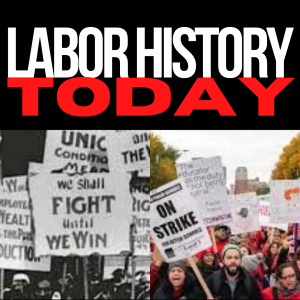
Originally released February 27, 2022
On July 17, 1944, a group of sailors and civilians were loading ships with ammunition and bombs at Port Chicago, a naval magazine and barracks in the San Francisco Bay Area. Tragically, the ships blew up in a massive explosion that instantly killed 320 workers and injured hundreds more. Most of the dead were African Americans, since racial segregation consigned Black soldiers and sailors to manual labor and service, including the dangerous work of transporting munitions. When the surviving workers were ordered back on the job without any additional safety measures or training, 50 refused to return. The resisters, dubbed the “Port Chicago 50,” were found guilty of disobedience of a lawful order and mutiny and received lengthy sentences and dishonorable discharges.
Today, the disaster and its aftermath are memorialized at the Port Chicago Naval Magazine National Memorial, one of a small number of National Park sites that commemorate death and dying on the job. Last October, as part of "Monumental Labor," a three-part online series that explored the memory of work and working peoples in National Parks and National Historic Landmarks, a distinguished panel discussed “Tragedy and Resistance at Port Chicago Naval Magazine.” Dr. Albert Broussard, Professor of History at Texas A&M University, Tom Leatherman, former Superintendent at the Port Chicago Naval Magazine National Memorial, and Dr. Erika Doss, Professor of American Studies at the University of Notre Dame, discussed African American labor in the West, the memorial’s role in shaping the memory of the Port Chicago disaster, and how the event should inform commonly-told histories of “America’s Greatest War.”
The "Monumental Labor" series was organized by Dr. Eleanor Mahoney and Dr. Emma Silverman. Dr. Mahoney has contributed to Labor History Today before, and we appreciate her help bringing this discussion to the podcast as Black History Month wraps up. Thanks also to the National Park Service, and to the National Park and Andrew W. Mellon Foundations, which helped make the series possible.
On this week’s Labor History in Two: The 1937 Woolworth Sit-Down (1937), and Criminalization of the Sit-Down (1939).
Questions, comments or suggestions welcome, and to find out how you can be a part of Labor History Today, email us at LaborHistoryToday@gmail.com
Labor History Today is produced by Union City Radio and the Kalmanovitz Initiative for Labor and the Working Poor. Editing this week by Patrick Dixon.
#LaborRadioPod #History #WorkingClass #ClassStruggle @GeorgetownKILWP #LaborHistory @UMDMLA @ILLaborHistory @AFLCIO @StrikeHistory #LaborHistory @NatlParkService @elbertscube
More Episodes
 2024-03-03
2024-03-03
 267
267
 2024-02-25
2024-02-25
 647
647
 2024-02-18
2024-02-18
 374
374
 2024-02-13
2024-02-13
 271
271
 2024-02-11
2024-02-11
 276
276
 2024-02-04
2024-02-04
 309
309
 2024-01-28
2024-01-28
 285
285
 2024-01-21
2024-01-21
 464
464
 2024-01-14
2024-01-14
 287
287
 2024-01-07
2024-01-07
 314
314
 2023-12-31
2023-12-31
 316
316
 2023-12-24
2023-12-24
 340
340
 2023-12-17
2023-12-17
 311
311
 2023-12-10
2023-12-10
 298
298
 2023-12-03
2023-12-03
 318
318
 2023-11-26
2023-11-26
 331
331
 2023-11-19
2023-11-19
 350
350
 2023-11-12
2023-11-12
 452
452
 2023-11-05
2023-11-05
 392
392
 2023-10-29
2023-10-29
 402
402
Create your
podcast in
minutes
- Full-featured podcast site
- Unlimited storage and bandwidth
- Comprehensive podcast stats
- Distribute to Apple Podcasts, Spotify, and more
- Make money with your podcast
It is Free
- Privacy Policy
- Cookie Policy
- Terms of Use
- Consent Preferences
- Copyright © 2015-2024 Podbean.com





